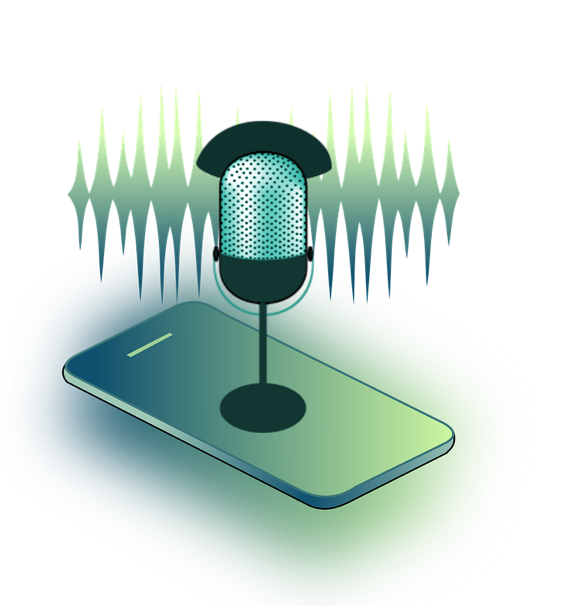The aim is to initiate a natural conversation that will spark the interest of your target audience and keep them coming back for more.
Surveys have shown the number of podcast listeners has surged in the last couple of years. According to a study published in the 2019 edition of ‘The Infinite Dial’, an annual survey by Edison Research and Triton Digital, more than half of the US population has listened to a podcast. This marks a huge shift in their popularity, with the study showing that one-third of the population has reported listening to a podcast within the last month. So why are we seeing such a sharp rise in the popularity of podcasts? And what exactly makes a good podcast? Read on to find out how you can get a slice of the action in the growing audio market.
What is a podcast?
For anyone new to the podcast scene, a podcast is essentially a digital audio file that is made available on the internet. Many podcasts are set up to function in a similar way to a TV or radio show, often focusing on different themes and including input from guest speakers. Most podcasts are offered in installments or as part of a series, and are available to download through streaming platforms such as iTunes or Spotify. You can often subscribe to a podcast you particularly enjoy and have it download onto your computer or phone automatically.
What kind of industries use podcasts?
The great thing about podcasts is the creative scope they can offer. They are often a great way to share a passion, cultivate a creative community and engage with audiences meaningfully. If you have a look through some of the podcasts available on iTunes for example, you will find that the topics are pretty much limitless. Popular themes might include politics, comedy, hobbies, sport, health, music or cycling, ranging to more niche topics like craft beer and sewing. Podcasters often invite interesting guests onto the show to discuss a particular topic or current event, and this can be scripted or improvised according to the structure of the podcast and tailored to the interests of a specific audience. Many celebrities such as Jonathan Van Ness and Fearne Cotton host highly successful podcasts which are often framed in a chat show format, and invite audiences to suggest new topics and share their thoughts.
Podcasts in business
Podcasts offer an invaluable tool for businesses to reach larger audiences and establish a creative community for their service, website or product. Many businesses use podcasts as a marketing tool and aim to cater for the interests of their target audiences. Some podcasts may offer useful advice to anyone looking to get into their industry or start their own business enterprise. Businesses often use their podcast as a platform to boost sales and increase their online presence and site traffic. Business podcasts need to be both inspiring and insightful in order to reach new audiences and generate a strong following. The podcast will need to compete with many other companies looking to secure the listener’s attention, which given that the average podcast length is around 43 minutes, is definitely something worth competing for.
What is the appeal of a podcast?
Podcasts are incredibly convenient to consume, which often makes them a popular choice. Unlike videos or blog posts which require full visual attention, listeners can simply download the podcast onto their phone, tablet or computer and listen whenever they like, perhaps while they’re on the way to work, making dinner or going for a run. It is easy to incorporate listening time into daily routines, and listeners can consume several different podcasts every week. Listeners can learn about new topics, engage in political discussions and improve their general knowledge. Podcasts can also help people to relax, unwind and laugh at the end of a busy or stressful day.
Can podcasts make money?

Every podcast has the potential to turn into a lucrative business venture, and many people are now using podcasts to develop an additional revenue stream for themselves. Popular podcasts can generate thousands of dollars through sponsorships or through the inclusion of commercial advertisements. Others raise funds by asking for listener contributions using an appropriate crowdfunding platform.
How can I get involved?
You don’t need to be a celebrity or run your own business to make a great podcast, and if you feel you have something to share with the world and are looking for a creative outlet, starting a podcast could be a good option for you. Starting a podcast will require a fair amount of preparation, however, and you’ll need to do your research first. If you’re looking for some useful advice on how to get started, have a look at this practical guide on how to start your own podcast.
You’ll need to think carefully about your target audience and what kind of content you could produce that would inspire them to keep listening or tell their friends about it. It’s always useful to have a look at what’s already out there, and think about how your podcast could offer something fresh and different from others in the audio market. Make sure your podcast is about something you’re genuinely passionate about so you’ll continue to be motivated to drive it forward and develop new material that is both informative and engaging. Many podcasts adopt a relaxed, conversational tone, so you won’t need to produce a word-for-word script for each episode. Inviting guests to feature in your podcast can be a great way to generate interest and keep the conversation going. The aim is to initiate a natural conversation that will spark the interest of your target audience and keep them coming back for more.
Another thing you’ll need to think about is any recording equipment you will need to record your podcast. You will need a high-quality microphone and computer to produce clear and accessible sound files, and a quiet recording environment with minimal background noise to achieve a professional sound. You can find some really useful tips on how to set up the best recording environment for your podcast here.


Join the conversation!